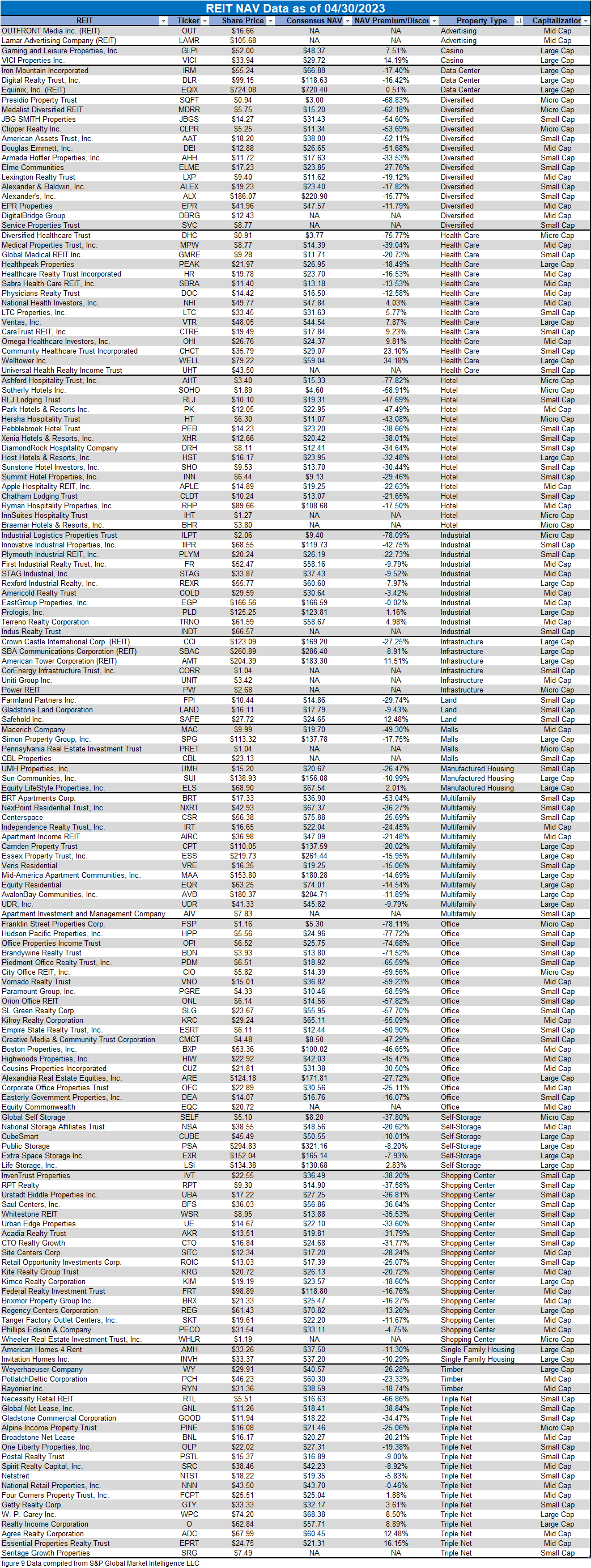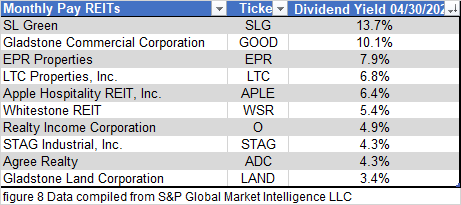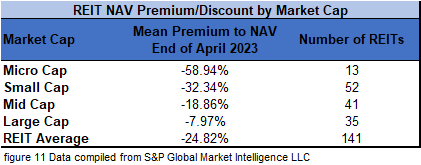The State of REITs: May 2023 Edition
- The REIT sector declined for the 3rd month in a row with a -2.88% total return in April.
- Large cap REITs (+1.35%) saw gains, while mid caps (-0.90%), small caps (-4.44%), and micro caps (-10.62%) all finished April in the red.
- 18% of REIT securities had a positive total return in April.
- Single-Family Housing (+6.30%) and Advertising (+4.22%) REITs saw strong gains in April. Infrastructure (-9.67%) and Office (-7.24%) REITs underperformed their REIT peers.
- The average REIT NAV discount widened from -23.51% to -24.82% during April. The median NAV discount narrowed from -22.22% to -20.73%.
REIT Performance
The REIT sector continues to feel the pain of rising interest rates with equity REITs averaging a negative total return for the 3rd straight month (-2.88%). REITs underperformed the Dow Jones Industrial Average (+2.6%), S&P 500 (+1.6%), and NASDAQ (+0.1%). The market cap weighted Vanguard Real Estate ETF (VNQ) had a much better total return than the average REIT in April (+0.31% vs. -2.88%) and is significantly outperforming YTD (+1.98% vs. -4.13%). The spread between the 2023 FFO multiples of large cap REITs (17.3x) and small cap REITs (11.9x) widened in April as multiples held steady for large caps and contracted 0.2 turns for small caps. Investors currently need to pay an average of 45.4% more for each dollar of FFO from large cap REITs relative to small cap REITs. In this monthly publication, I will provide REIT data on numerous metrics to help readers identify which property types and individual securities currently offer the best opportunities to achieve their investment goals.
6 out of 18 Property Types Yielded Positive Total Returns in April
33.33% percent of REIT property types averaged a positive total return in April, with a 15.97% total return spread between the best and worst performing property types. Single Family Housing (+6.30%) and Advertising (+4.22%) were the best performing property types in April. Both of the Single Family Housing REITs, Invitation Homes (INVH) (+6.85%) and American Homes 4 Rent (AMH) (+5.76%), built upon the gains they achieved in Q1 2023.
Infrastructure (-9.67%) and Office (-7.24%) REITs continued to underperform their REIT peers in April. These troubled property types accounted for 7 of the 10 worst performing REITs in April.
Performance of Individual Securities
Veris Residential (VRE) (+11.68%) was the top performing REIT in April, fueled in part by a strong Q1 earnings beat. On April 26th Veris reported better than expected FFO/share as well as year-over-year improvement on multiple key metrics. VRE was one of only 5 equity REITs that achieved double-digit positive returns in April.
A trio of RMR Group (RMR) managed REITs rounded out the worst performing REITs in April: Office Properties Income Trust (OPI) (-45.08%), Industrial Logistics Properties Trust (ILPT) (-32.55%) and Diversified Healthcare Trust (DHC) (-31.64%). RMR-managed REITs are notorious for having historically delivered significantly worse investor returns than internally managed REITs or other externally managed REITs. April’s disproportionately brutal share price declines were driven by the announcement of a merger of OPI and DHC that is expected to close in Q3 2023. The combined entity will rebrand as Diversified Properties Trust and will continue to be managed by RMR.
34.18% of REITs had a positive total return in April with 42.86% in the black year to date. During the first four months of last year the average REIT had a -7.01% return. During the first four months of this year, the average REIT has had a slightly less rough start with a -4.13% total return.

Dividend Yield
Dividend yield is an important component of a REIT’s total return. The particularly high dividend yields of the REIT sector are, for many investors, the primary reason for investment in this sector. As many REITs are currently trading at share prices well below their NAV, yields are currently quite high for many REITs within the sector. Although a particularly high yield for a REIT may sometimes reflect a disproportionately high risk, there exist opportunities in some cases to capitalize on dividend yields that are sufficiently attractive to justify the underlying risks of the investment. I have included below a table ranking equity REITs from highest dividend yield (as of 04/30/2023) to lowest dividend yield.

Although a REIT’s decision regarding whether to pay a quarterly dividend or a monthly dividend does not reflect on the quality of the company’s fundamentals or operations, a monthly dividend allows for a smoother cash flow to the investor. Below is a list of equity REITs that pay monthly dividends ranked from highest yield to lowest yield.
REIT Premium/Discount to NAV by Property Type
Below is a downloadable data table, which ranks REITs within each property type from the largest discount to the largest premium to NAV. The consensus NAV used for this table is the average of analyst NAV estimates for each REIT. Both the NAV and the share price will change over time, so I will continue to include this table in upcoming issues of The State of REITs with updated consensus NAV estimates for each REIT for which such an estimate is available.

Takeaway
The large cap REIT premium (relative to small cap REITs) widened in April and investors are now paying on average about 45% more for each dollar of 2023 FFO/share to buy large cap REITs than small cap REITs (17.3x/11.9x – 1 = 45.4%). As can be seen in the table below, there is presently a strong positive correlation between market cap and FFO multiple.
The table below shows the average premium/discount of REITs of each market cap bucket. This data, much like the data for price/FFO, shows a strong, positive correlation between market cap and Price/NAV. The average large cap REIT (-7.97%) trades at a single digit discount to NAV, while mid cap REITs (-18.86%) trade at a double-digit discount to NAV. Small cap REITs (-32.34%) trade at a little over 2/3 of NAV. Micro caps on average trade at just over 40% of their respective NAVs (-58.94%).
The number of bankruptcy filings declined month over month in April but remains at an elevated level. In the first four months of 2023, there have been more filings than in the first third of any year since 2010 and more than twice as many as there were over the same period last year. Rising interest rates and declining economic fundamentals are likely to continue to fuel bankruptcies throughout the remainder of 2023.
Whenever a retail bankruptcy or store closure is announced, it is always important to identify whether that retailer is the tenant of any REITs and the potential magnitude of impact that could be felt by those REITs. Bankruptcies often result in store closures, which causes a decrease to the REIT landlord’s rent collection and an increase in vacancy. Bed Bath & Beyond (BBBYQ) is the largest retailer to file bankruptcy thus far in 2023 and is reported as a top tenant of 12 REITs.
Kimco Realty (KIM) has the most total square footage leased to Bed Bath & Beyond, comprised of 823,000 square feet across 31 leases for a total annual base rent of $9.8M or 0.7% of total portfolio rent. RPT Realty (RPT), however, has the largest portion of its portfolio (3.0%) currently leased to Bed Bath & Beyond as well as the largest portion of total portfolio annual base rent (2.3%). Whereas Armada Hoffler Properties (AHH), Brixmor Property Group (BRX), and Regency Centers (REG) have only 0.6% of their annual base rent tied to Bed Bath and Beyond. REIT investors would be wise to review the top tenants of all REITs in which they already own shares or are considering making an investment. REITs with strong tenants have the potential to significantly outperform those with weaker tenants. This fundamental outperformance could translate to meaningful alpha for discerning investors over the upcoming years.
Important Notes and Disclosure
All articles are published and provided as an information source for investors capable of making their own investment decisions. None of the information offered should be construed to be advice or a recommendation that any particular security, portfolio of securities, transaction, or investment strategy is suitable for any specific person. The information offered is impersonal and not tailored to the investment needs of any specific person.
We cannot determine whether the content of any article or recommendation is appropriate for any specific person. Readers should contact their financial professional to discuss the suitability of any of the strategies or holdings before implementation in their portfolio. Research and information are provided for informational purposes only and are not intended for trading purposes. NEVER make an investment decision based solely on the information provided in our articles.
We may hold, purchase, or sell positions in securities mentioned in our articles and will not disclose this information to subscribers, nor the time the positions in the securities were acquired. We may liquidate shares in profiled companies at any time without notice. We may also take positions inconsistent with the information and views expressed on our website.
We routinely own and trade the same securities purchased or sold for advisory clients of 2MCAC. This circumstance is communicated to our clients on an ongoing basis. As fiduciaries, we prioritize our clients’ interests above those of our corporate and personal accounts to avoid conflict and adverse selection in trading these commonly held interests.
Past performance does not guarantee future results. Investing in publicly held securities is speculative and involves risk, including the possible loss of principal. Historical returns should not be used as the primary basis for investment decisions. Although the statements of fact and data in this report have been obtained from sources believed to be reliable, 2MCAC does not guarantee their accuracy and assumes no liability or responsibility for any omissions/errors
Commentary may contain forward-looking statements that are by definition uncertain. Actual results may differ materially from our forecasts or estimations, and 2MCAC and its affiliates cannot be held liable for the use of and reliance upon the opinions, estimates, forecasts, and findings in this article.
Through October 2021, The State of REITs was published exclusively on Seeking Alpha by Simon Bowler, Sector Analyst at 2nd Market Capital Services Corporation (2MCSC). Editions subsequent to October 2021 will be published on this website in addition to other platforms that may include Seeking Alpha. 2MCSC was formed in 1989 and provides investment research and consulting services to the financial services industry and the financial media. 2MCSC does not provide investment advice. 2MCSC is a separate entity but related under common ownership to 2nd Market Capital Advisory (2MCAC), a Wisconsin registered investment advisor. Simon Bowler is an investment advisor representative of 2MCAC. Any positive comments made by others should not be construed as an endorsement of the author's abilities to act as an investment advisor.
S&P disclosure: S&P Global Market Intelligence LLC. Contains copyrighted material distributed under license from S&P.











